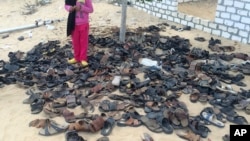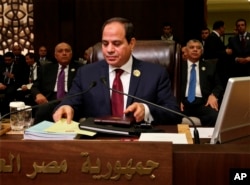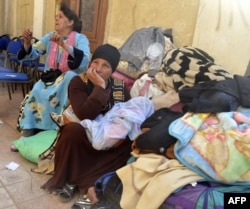Faced with a growing threat from terrorists, Egypt needs a better approach to combat the issue, some leading Washington-based anti-terrorism experts told VOA.
Egyptian President Abdel-Fattah el-Sissi last week ordered his security forces to use "all brute force" to restore "security and stability" in the troubled Sinai Peninsula in three months.
The order came after a deadly terrorist attack on a crowded Sufi mosque last month that left more than 300 worshippers dead in the northern Sinai village of al-Rawdah — the deadliest assault by Islamic extremists in Egypt's modern history. Among the 305 dead were 27 children; another 128 people were wounded.
El-Sissi's government has been engaged in a bloody war against an increasingly violent insurgency in northern Sinai, where several militant groups, including Ansar Beit al-Maqdis, which has pledged allegiance to the Islamic State group, have been active for the last few years. The militant groups regularly target police, security forces and the minority Coptic community in the region.
The militant campaign in the peninsula accelerated after the Egyptian military overthrew elected Islamist President Mohammed Morsi in 2013. Since then, nearly 1,000 security personnel have been killed in more than 1,700 terror attacks across the peninsula, according to the Washington-based Tahrir Institute for Middle East Policy.
Analysts say the attack on the Sufi mosque indicates that the government's current approach to eradicating terrorism is not successful and the country needs a comprehensive strategy rather than setting a time limit for defeating the growing militancy.
"It is almost exactly the opposite of what you want to do; in an insurgency, setting a time limit might play well politically back in the home office, but it almost never works. It usually emboldens the rebels," David Des Roches, an associate professor at the National Defense University in Washington, told VOA. "What it basically says to the insurgents is all you have to do is lay low for three months, then you can come back with strong force."
Des Roches added that giving a deadline to security forces, and allowing them to use brute force, tends to push aside the judgment and discretion needed to tackle insurgents, as well as alienating local populations, which could intensify the insurgency.
Excessive force
Local Bedouin in Sinai have accused government forces of indiscriminately bombing their villages as militants frequently hide among the local population.
Des Roches said poorly designed campaigns hurt civilians "that may be passively supporting the insurgency or may be neutral" and these people "tend to be pushed over into the insurgents' side."
Michael O'Hanlon, a defense and foreign policy expert at the Brookings Institution in Washington, echoed Des Roches's views and said setting a deadline could be counterproductive in the fight against insurgents.
"You give young men weapons and give them a sense that they are being asked to use all means necessary to brutally root out a problem and they will sometimes overdo it," O'Hanlon told VOA, adding that the excessive and indiscriminate use of force in population areas where insurgents might be residing could create more problems for the government instead of eradicating militancy.
As part of the government's counterinsurgency measures, hundreds of houses in the Rafah region, which borders the Gaza strip and Israel, have been razed by the Egyptian military, displacing more than 10,000 people, according to media reports.
"What you have to do is to be patient in developing intelligence, and you have to build networks of informants; you have to build trust with the local population to provide you information," O'Hanlon added. "The application of force is the easier part; the harder part is developing intelligence and the better your intelligence, the less you will do in the way of collateral damage."
Concerns of locals
Analysts believe that besides the military measures, combating the insurgency requires addressing the economic, religious or political concerns of local people.
"To create, first of all, a sense of fair political participation, representation, have some of their own people in the government listen to those people," O'Hanlon said. "Same thing for the security forces; they have to be balanced, include some of the people from whatever region that is an issue, then it has to be some sense of economic hope and a sense of a future worth working for."
Analysts say the conflict is causing worsening conditions for civilians in the region, which already is one of the most underdeveloped in Egypt and has largely been neglected by the central government in Cairo.
Jobs and economic opportunities are scarce and the government's counterinsurgency measures have effectively cut off communication, imposed long curfews, and blocked chat and internet calling applications in the region. An entry to the major city of Arish, for instance, requires proof of residency there.






